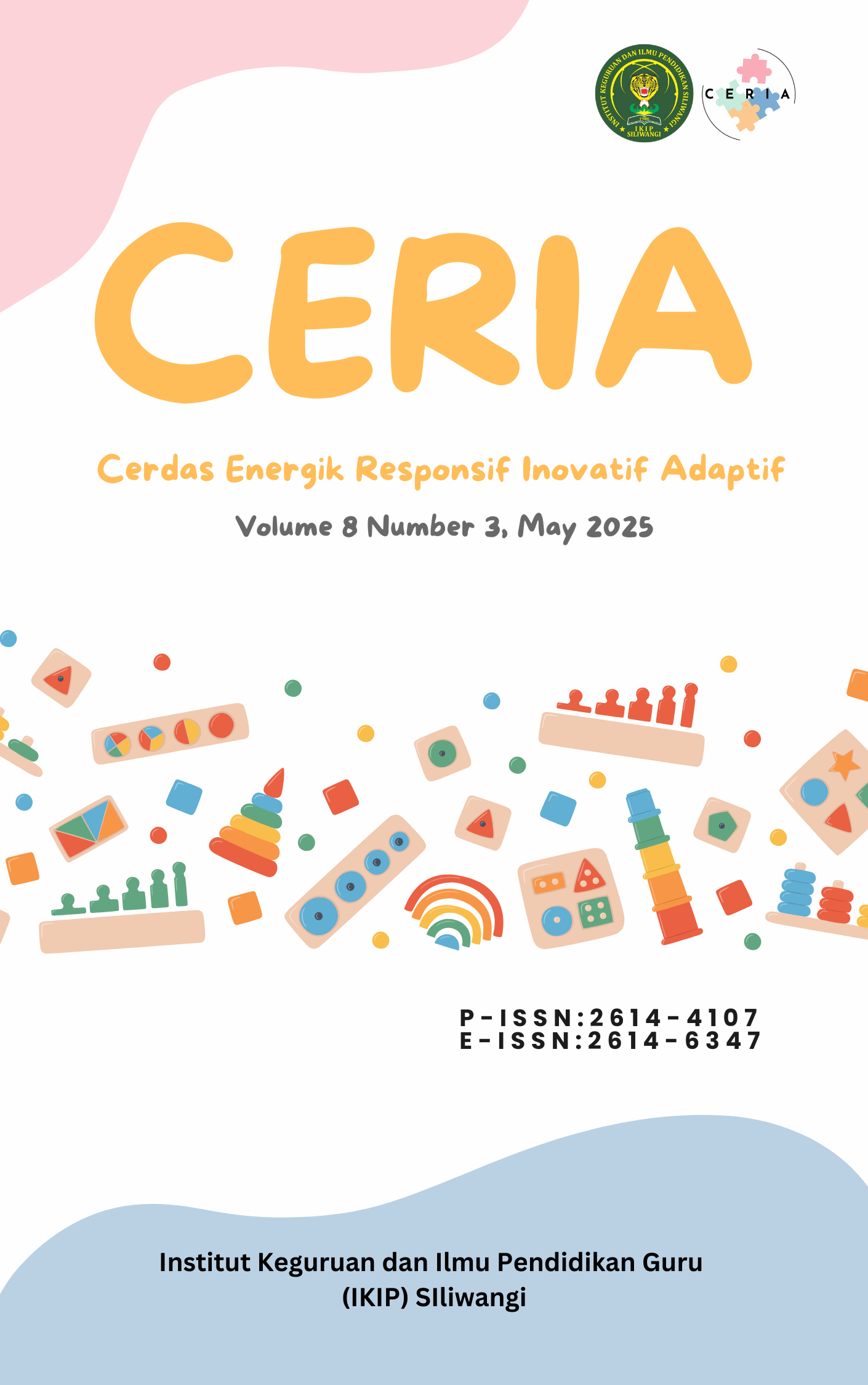Project Based Learning: Model Pembelajaran dalam Meningkatkan Keterampilan Berpikir Kritis Anak Usia Dini
DOI:
https://doi.org/10.22460/ceria.v8i3.27041Keywords:
Critical Thinking Skill, Project Based Learning, Early ChildhoodAbstract
The low critical thinking skills of children aged 5–6 years require an appropriate learning model. The project-based learning model is a child-centered approach that provides direct experiences for children. The purpose of this study was to improve the critical thinking skills of children aged 5–6 years through the project-based learning model at Sinarmulya Playgroup. This study is classroom action research using the Kemmis and Taggart model, conducted in two cycles. The study subjects were 11 children aged 5–6 years at Sinarmulya Playgroup. Data were collected through observation, interviews, and documentation and analyzed using quantitative and qualitative methods. The results showed that, before the intervention, children's critical thinking development was as follows: Not Developing—60.80%, Starting to Develop—27.40%, and Developing According to Expectations—11.80%. After implementing cycles I and II using the project-based learning model, children's critical thinking skills—measured by indicators such as making observations, asking questions, expressing opinions, connecting cause and effect, classifying by type, conducting experiments, identifying similarities and differences, proposing alternative solutions, and drawing conclusions—increased to: Starting to Develop – 6.40%, Developing According to Expectations – 62.70%, and Developing Very Well – 31%. In cycles I and II, the results showed that the project-based learning model can improve children's critical thinking skills.
References
Anggraeni, C. [2015]. Peningkatan kemampuan berpikir kritis melalui metode eksperimen berbasis lingkungan (Penelitian tindakan di Kelompok B PAUD Mentari, Kab. Bengkulu Selatan, Tahun 2014/ 2015). Jurnal pendidikan Anak Usia Dini, 9 (2), 343-360. https://doi.org/10.21009/JPUD.092.09
Cáceres, M., Nussbaum, M., & Ortiz, J. (2020). Integrating critical thinking into the classroom: A teacher’s perspective. Thinking Skills and Creativity, 37(May), 100674. https://doi.org/10.1016/j.tsc.2020.100674.
Cleovoulou, Y., & Beach, P. (2019). Teaching critical literacy in inquiry-based class-rooms : Teachers ’ understanding of practice and pedagogy in elementary schools. Teaching and Teacher Education, 83, 188–198. https://doi.org/10.1016/j.tate.2019.04.012.
Dewi, F., Syamsuardi, & Ria, A.S.E [2023]. Penerapan problem based learning menggunakan bahan pangan untuk meningkatkan kritikal thingking anak (Penelitian tindakan di kelompok A TK Tunas Rimba Ngawi, Kab. Ngawi tahun 2021/2022). Jurnal profesi kependidikan. 4 (1), 113-121. https://ojs.unm.ac.id/JPK/article/view/30432
Dzihnih, R. Z.[2020]. Model pembelaran project based learning sebagai stimulasi keterampilan berpikir kritis. [Skripsi, Universitas Pendidikan Indonesia, 2020]. http://repository.upi.edu/56897/1/S_PAUD_1608092_Title.pdf
Mendikbud, (2020). Mengenal konsep project-based learning. [2020, 05 Mei]. https://gtk.kemdikbud.go.id/read-news/mengenal-konsep-projectbased-learning
Khairi, H. (2018). Karakteristik perkembangan anak usia dini dari 0-6 tahun. Jurnal warna, 2(2), 15-28. https://download.garuda.kemdikbud.go.id/article.php?article=907930&val=14298&title=KARAKTERISTIK%20PERKEMBANGAN%20ANAK%20USIA%20DINI%20DARI%200-6%20TAHUN
Nyihana, E. (2021). Metode PjBL berbasis scientific approach dalam berpikir dan komunikasi bagi anak. Indramayu : Penerbit Adab
Nasirun, M., Indrawati, I & Suprapti, A. (2021). Studi tingkat pemahaman guru PAUD dalam Penelitian Tindakan Kelas (PTK). Jurnal Ilmiah Potensia, 6(1), 26-36. doi:https://doi.org/10.33369/jip.6.1.26-36
Slavin, R. E. (2011). Psikologi pendidikan: Teori dan praktik. Jakarta: Indeks.


